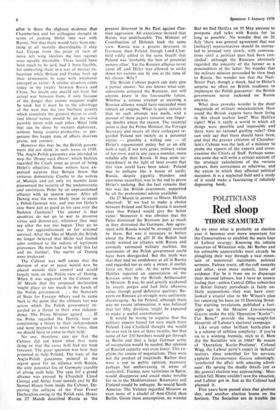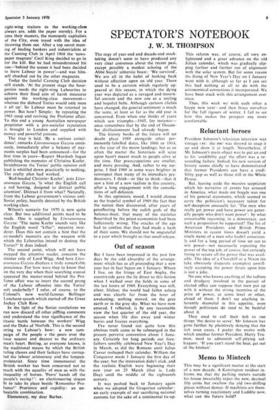POLITICIANS
Red sloop
TIBOR SZAMUELY _
As we enter what is probably an election year it becomes ever more important for the Conservatives to establish the main lines of Labour strategy. Knowing the infinite resources of Wilsonian wile, Mr Barber and his estimable apparatchiks must already be ploughing their way through a vast moun-3 tain of ministerial statements, political sermons, Fabian tracts, off-the-cuff remarks and other, even more esoteric, items of evidence. Far be it from me to disparage their devoted labours, but I have an uneasy feeling that—unless Central Office subscribes to Soviet literary periodicals (a fairly un- likely supposition)—they may have over, looked a crucial clue to Mr Wilson's plan for renewing his lease on 10 Downing Street. The startling revelations published a fort- night ago in the Moscow Literaturnaya Gazeta under the title 'Operation "Keeler": Cui Bono?' provide the long-sought-for blueprint of Labour's electoral campaign.
Like every other brilliant battle-plan it is a scheme of sublime simplicity: if you're on to a winning formula, stick to it. How did the Socialists win in 1964? By means of 'Operation Keeler-Profumo'. Colonel Wigg, the Labour party's expert in 'delicate' matters, since ennobled for his services, explains Literaturnaya Gazeta admiringly, 'conducted the affair with amazing adroit- ness'. He sprung the deadly details just as the general election was approaching: Mac. millan fell, Home couldn't save the situation, and Labour got in. Just as the Colonel had planned it.
Five years have passed since that glorious day, and another election looms on the horizon. The Socialists are in trouble (as right-wing traitors to the working-class always are, adds the paper sternly). For a time their masters, the monopoly capitalists of the City, even toyed with the idea of throwing them out. After a top secret meet- ing of leading bankers and industrialists at the Canning Club in April 1968 the 'news- paper magnate' Cecil King decided to go in for the kill. But he had misunderstood his cue—'behind the scenes it had been decided to leave Labour in power'—and was him- self chucked out by the other magnates.
Today the fateful Canning Club decision still stands. 'At the present stage the bour- geoisie needs the right-wing Labourites to
achieve their fixed aim of harsh measures against the working-class movement—
whereas the diehard Tories would only mess it all up'. So Labour must be returned to power. But how? Simple: by repeating the 1963 coup and reviving the Profumo affair. To this end a young Australian newspaper proprietor with a pro-socialist reputation is brought to London and supplied with money and powerful patrons.
The trap is laid. 'By a curious coinci- dence', remarks Literaturnaya Gazeta omin-
ously, immediately after a balance of pay- ments surplus had been announced—for the first time in years—Rupert Murdoch began publishing the memoirs of Christine Keeler. Straightaway the Tories' public opinion poll lead is whittled down practically to nothing. The crafty plan had worked.
'Red-headed Christin' Keeler', jests Liter- aturnaya Gazeta, 'is what the. English call
a red herring, designed to distract public attention'. Distract it from what? Naturally, from the Labour government's vicious anti- Soviet policy, heartily detested by the British working-class.
Wilson's scenario for 1970 is now quite clear. But two additional points need to be made. One is supplied by Literaturnaya Gazeta: 'The name Keeler sounds very like the English word "killer", meaning mur- derer. Does this not contain a hint that the ex-model's memoirs are the weapon with which the Labourites intend to destroy the Tories?' It does indeed.
The second point, which will not have escaped the attentive reader, concerns the
sinister role of Lord Wigg. And here Liter-
aturnaya Gazeta displays a truly remarkable prescience. For how were they to know that on the very day when their searching exposé appeared the master-mind behind the Pro- fumo affair was to insert the second prong of the Labour offensive into the Tories' soft underbelly? I refer, of course, to the Colonel's now world-famous Bollinger Luncheon speech which started off the Great Jockey Club Row.
In the light of the Soviet revelations we can now discard all other piffling comments and understand the true significance of the titanic battle between the workers' Wigg and the Duke of Norfolk. This is the second string to Labour's bow: a new cam- paign of the people v the - peers over the issue nearest and dearest to the ordinary man's heart. Betting, as everyone knows, is the traditional means by which the British ruling classes and their lackeys have corrup- ted the labour aristocracy and the lumpen- proletariat. Since time immemorial the British worker has been concerned not so much with the equality of men as with the inequality of horses. 'Peers' hands off the people's racing!': an electioneering slogan fit to take its place beside 'Remember Pro- fumo!' Prurience and cupidity: an un- beatable combination.
Elementary, my dear Barber.















































 Previous page
Previous page